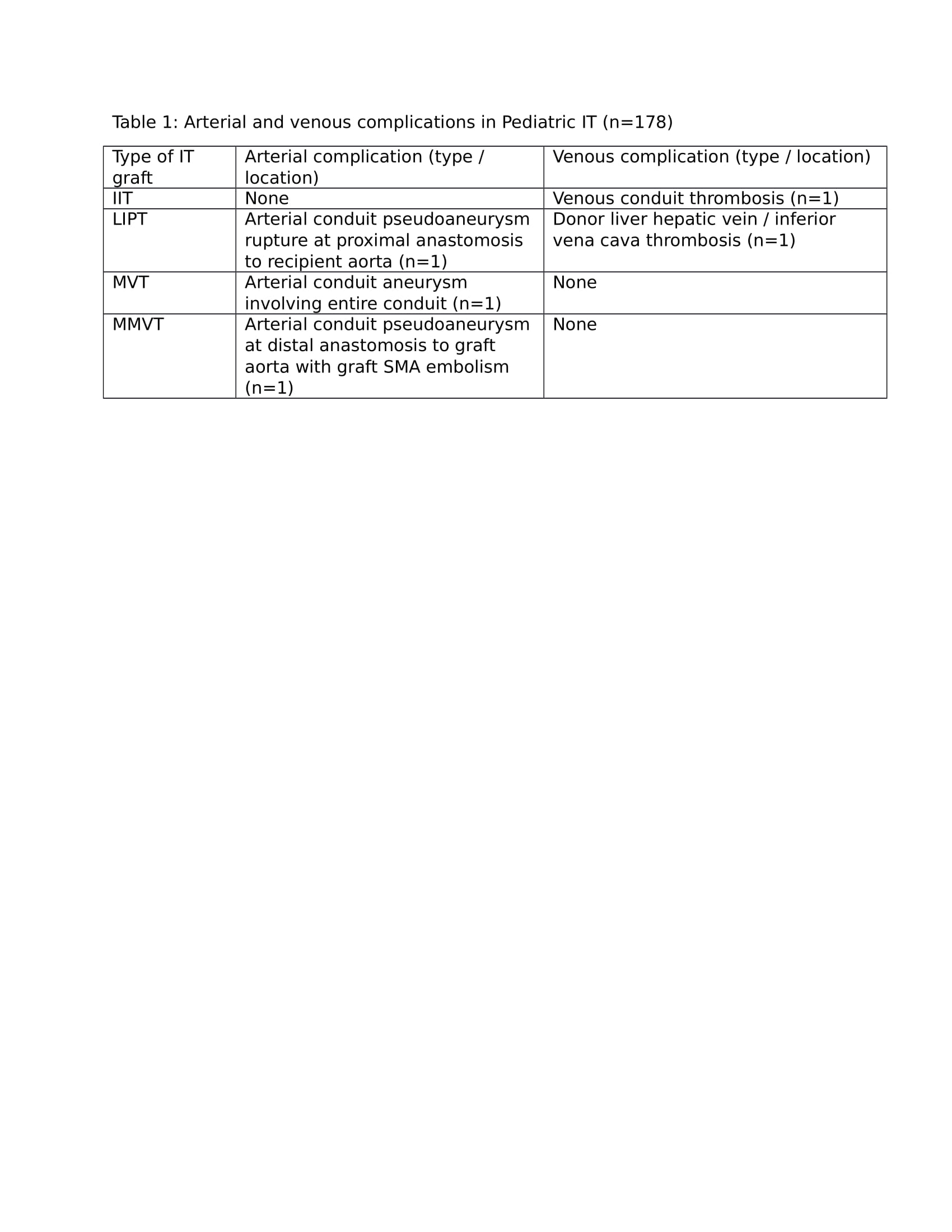Vascular Complications in Pediatric Intestine Transplant Recipients – Treatment Strategies and Outcomes
University of Pittsburgh Medical Center, Pittsburgh, PA
Meeting: 2020 American Transplant Congress
Abstract number: C-321
Keywords: Intestinal transplantation, Pediatric, Surgical complications
Session Information
Session Name: Poster Session C: Small Bowel: All Topics
Session Type: Poster Session
Date: Saturday, May 30, 2020
Session Time: 3:15pm-4:00pm
 Presentation Time: 3:30pm-4:00pm
Presentation Time: 3:30pm-4:00pm
Location: Virtual
*Purpose: To identify vascular complications in pediatric intestine transplant (IT) recipients, evaluate treatment strategies, and review their impact on graft loss and patient mortality.
*Methods: Retrospective single-center study of all pediatric IT recipients was performed from January 1, 2003 to October 31, 2019.
*Results: 178 pediatric IT were performed including 77 isolated intestine transplants (IIT), 57 liver/ intestine/ pancreas transplants (LIPT), 37 multivisceral transplants (MVT), and 7 modified multivisceral transplants (MMVT). Mean recipient age at IT was 6.5 (+/- 6.3) years. Arterial and venous conduits were used to establish graft inflow and outflow, respectively, in 62 / 77 (80%) IIT. In all LIPT, MVT, and MMVT cases, arterial conduits were used to establish graft inflow while no venous conduits were required since the outflow reconstruction was directly into the hepatic vein or portal/superior mesenteric vein. Mean follow-up was 8.2 (+/- 5.2) years. Arterial complications occurred in 0 IIT, 1 (1.8%) LIPT, 1 (2.7%) MVT and 1 (14%) MMVT, respectively. Venous complications occurred in 1 (1.3%) IIT, 1 (1.8%) LIPT, 0 MVT and 0 MMVT, respectively. Type of arterial and venous complications are summarized in Table 1. Arterial complications occurred in 3 / 178 (1.7%) pediatric IT recipients. Arterial complications were successfully resolved with endovascular stenting of pseudoaneurysm in one patient and surgical resection of aneurysm in one patient. Endovascular stenting of pseudoaneurysm was technically not feasible in one patient. Ultimately, two out of these three patients required redo MVT in an elective fashion with long-term survival of more than 10 years with functioning redo MVT grafts. Venous complications occurred in 2 / 178 (1.1%) pediatric IT recipients. Venous complications were successfully resolved with surgical thrombectomy of venous conduit thrombosis in one patient. Overall graft and patient loss in this series was 37% and 25% respectively. Vascular complications accounted for 2% of overall graft and 1% of patient loss respectively.
*Conclusions: Timely diagnosis and management with endovascular / surgical techniques may allow graft salvage and prevent patient mortality from vascular complications in pediatric IT recipients.
To cite this abstract in AMA style:
Amin A, Chang Y, Emmanuel B, Ganoza A, Bond G, Khanna A, Soltys K, Sindhi R, Mazariegos G. Vascular Complications in Pediatric Intestine Transplant Recipients – Treatment Strategies and Outcomes [abstract]. Am J Transplant. 2020; 20 (suppl 3). https://atcmeetingabstracts.com/abstract/vascular-complications-in-pediatric-intestine-transplant-recipients-treatment-strategies-and-outcomes/. Accessed February 14, 2026.« Back to 2020 American Transplant Congress

